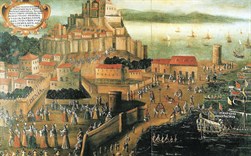The expulsion of the Moriscos
 The long history of Muslim presence in the Iberian peninsula was destined to end in 1609, when King Philip III and his historical favourite, the Duke of Lerma, decided to make a drastic move which, they thought, would guarantee their wide acceptance, and would be the solution to a long-standing problem which would have been desired by much of the population. There was widespread fear that the Muslims left in Spain could be allies with the Ottoman Empire, always seen as possible invaders of the Iberian coast. Past examples of revolt by the moriscaThe term Moriscos was used to designate the descendants of the Moors, after the Christian Reconquista, that had formally agreed to repent and abandon Islam. In reality, the morisca population continued to maintain their traditional ways and to practice the Muslim religion in secret. From 1609 until 1614, on the orders of Philip III all the Moriscos, approximately 300,000 people, were expelled from the Iberian Peninsula. population always inspired the fear that a new tumult was at the door. In addition, the desire to balance the controversial decision to conclude the twelve years’ truceThe Truce period of twelve years (1609-1621) momentarily interrupted the long conflict that began in 1568 between the Spanish monarchy and the United Provinces. The war resumed at the expiration of the truce until the Peace of Westphalia (1648), with which the Habsburgs finally recognized the independence achieved by the “rebels” of Flanders. with the rebellious United Provinces was one of the conditions that favored the expulsion of the Moriscos, promulgated on 9 April, 1609. For a long time, the Duke of Lerma had shown himself to be, if not against, at least not interested in the question of the Muslim minority, whose industriousness and efficiency he was able to observe during his stint as viceroy in Valencia. But confronted with political difficulty, he yielded to the pressures of a large part of Castilian society. Five years after the decree of expulsion, in 1614, the final outcome of this policy was the forced removal from the Iberian Peninsula of more than 300,000 Moriscos, of which approximately 130,000 from the kingdom of Valencia (almost a third of its total population). This decision was to have important consequences for the subsequent development of Spanish history.
The long history of Muslim presence in the Iberian peninsula was destined to end in 1609, when King Philip III and his historical favourite, the Duke of Lerma, decided to make a drastic move which, they thought, would guarantee their wide acceptance, and would be the solution to a long-standing problem which would have been desired by much of the population. There was widespread fear that the Muslims left in Spain could be allies with the Ottoman Empire, always seen as possible invaders of the Iberian coast. Past examples of revolt by the moriscaThe term Moriscos was used to designate the descendants of the Moors, after the Christian Reconquista, that had formally agreed to repent and abandon Islam. In reality, the morisca population continued to maintain their traditional ways and to practice the Muslim religion in secret. From 1609 until 1614, on the orders of Philip III all the Moriscos, approximately 300,000 people, were expelled from the Iberian Peninsula. population always inspired the fear that a new tumult was at the door. In addition, the desire to balance the controversial decision to conclude the twelve years’ truceThe Truce period of twelve years (1609-1621) momentarily interrupted the long conflict that began in 1568 between the Spanish monarchy and the United Provinces. The war resumed at the expiration of the truce until the Peace of Westphalia (1648), with which the Habsburgs finally recognized the independence achieved by the “rebels” of Flanders. with the rebellious United Provinces was one of the conditions that favored the expulsion of the Moriscos, promulgated on 9 April, 1609. For a long time, the Duke of Lerma had shown himself to be, if not against, at least not interested in the question of the Muslim minority, whose industriousness and efficiency he was able to observe during his stint as viceroy in Valencia. But confronted with political difficulty, he yielded to the pressures of a large part of Castilian society. Five years after the decree of expulsion, in 1614, the final outcome of this policy was the forced removal from the Iberian Peninsula of more than 300,000 Moriscos, of which approximately 130,000 from the kingdom of Valencia (almost a third of its total population). This decision was to have important consequences for the subsequent development of Spanish history.
